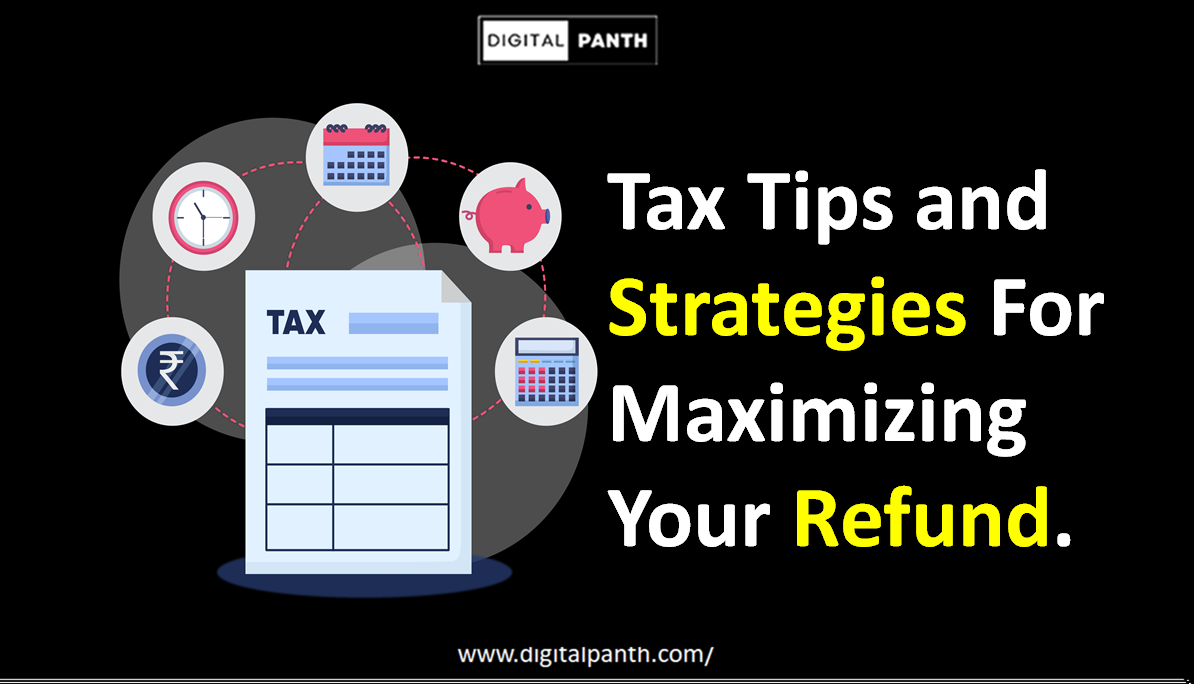The income tax season can often be a cause of anxiety and uncertainty for many people. As it is important to keep in mind that submitting your income tax return (ITR) does not mean about meeting your legal responsibilities, it also offers a chance to maximize your tax refund. By having the appropriate knowledge and adopting some tips and strategies to maximize your tax refund, you can guarantee that you have obtained all the available benefits to increase your financial situation. Income tax is very important and very necessary for the development of a nation. It serves as the primary source of revenue generation for the government. These funds are used for salaries, welfare programs, government initiatives, defence and many other programs. To ensure that all taxable people contribute their share to the government, taxpayers must submit Income Tax Returns (ITR) with the tax payment.
What is an income tax return?
An income tax return, or ITR, is a document which is used to report your total taxable income for the specific financial year. Taxpayers utilize the form to officially report their income, deductions taken, exemptions, and taxes settled. Finally, it calculates your net income tax liability for a financial year. As per the Income Tax Act of 1961, those people whose income is taxable are required to submit tax returns. If you have earned more than Rs. 2.5 lakh in a fiscal year or have submitted advance tax, it is necessary for you to file an ITR. When submitting tax returns, you must also pay the taxes owed according to your relevant income tax brackets. A tax return consists of a form submitted to a tax authority which has details of income, expenses, and other relevant investments for tax exemptions. Tax returns enable taxpayers to determine their tax liability, arrange tax payments, or seek refunds for any excess tax payments.
Tips and strategies to maximize your refund.
The first and most important step to file ITR is selecting the correct ITR form that is meant for you and then submitting the correct and properly filled form in a timely manner. The form includes all the income gained by you throughout the year and also claiming valid deductions from the various sections which are suitable to you. Tax refunds can be maximised by utilizing all qualifying deductions from sections as 80C, 80D, and 24(b), investing in tax-saving options like PPF and ELSS, and claiming HRA exemptions. The main tips and strategies to maximize your refund are:
Tip no. 1.
- Understanding essential deductions and exemptions: Taxpayers should utilize every available deduction and exemption to lower their tax liability. Analysing the Income Tax Act is crucial for understanding the deductions and exemptions available to you when submitting your Income Tax Return (ITR) in India. The deductions and exemptions differ depending on your category, whether you are a salaried person, retiree, or self-employed person.
. Deduction s under Section 80C: Numerous deductions are included under Section 80C of the Income Tax Act in India. This clause allows you to request deductions for numerous investments and costs for lowering your taxable income and possibly reducing your tax burden. Here is a list of the deductions accessible to you under section 80C:
• Public Provident Fund: Contributions to the Public Provident Fund (PPF) qualify for deductions under Section 80C. PPF is a popular long-term investment choice as it offers tax advantages and attractive interest rates.
• Equity-Linked Savings Schemes: Under Section 80C, tax deductions are permitted for investments in equity-linked savings schemes (ELSS), which are a form of equity mutual fund. In comparison to conventional choices such as PPF, ELSS can offer greater returns, yet it is more vulnerable to market risks.
• National Pension System: Contributions to Tier-I National Pension Scheme (NPS) accounts can be deducted under Section 80C. NPS is a long-term retirement savings plan that offers tax incentives on contributions, investment growth, and the final pay-out.
• Life insurance premiums: Under specific conditions, Section 80C permits you to deduct the premiums paid for life insurance policies for you, your spouse, or your dependent children.
• Tuition fees: Section 80C allows for the deduction of tuition expenses for a maximum of two children, including legally adopted children, who are enrolled full-time in any school, college, university, or other educational institution in India. There is a limit on the funds that can be retained for educational purposes abroad.
- Deduction under section 80D: According to Section 80D of the Income Tax Act in India, you are eligible to claim deductions for health insurance premiums paid for yourself, your family, and in certain situations, your dependent parents. Here’s a short summary:
• Deduction for health insurance: People are eligible to claim deductions for health insurance premiums paid for themselves, their spouse, and dependent children.
• Deduction for health insurance of parents (above 60): You can claim an increased deduction for your parents’ health insurance premiums until they reach 80.
• Deduction for critical illness coverage: Payments made to reputable insurance companies for different health policies, such as individual, family floater, and critical illness coverage. Coverage for Ayurvedic treatments is also provided.
• Deduction for yearly check-ups: The highest limits for deductions which can be claimed by people below 60 years, that is, Rs 25,000, covering yearly check-ups.
• Deduction for health check-ups of senior citizens: People above 60 years can claim a deduction of Rs 50,000, which includes yearly health examinations.
• Deduction for health check-ups of elder parents: Deduction of an extra Rs 25,000 for parents up to 80 years or Rs 50,000 if they exceed 80 years can be claimed.
• Deduction for Preventive Health Check-ups: Preventive health examinations charges can be deducted up to Rs 5,000 annually depending upon the overall limits.
- Deductions under Section 24:
• Deduction for home loan: Section 24 of the Income Tax Act allows you to claim deductions for interest on home loans which ultimately decreases your taxable income.
• Deduction for self-occupied property: For self-occupied properties, the annual deduction cap is Rs 2 lakh, whereas there is no cap for rental properties. Interest accrued before construction can be deducted in portions, and co-borrowers can claim deductions based on their share.
• Deduction on interest of home loans: The interest part of the EMI can be deducted under Section 24, while the principal repayment may be eligible for claim under Section 80C.
- Exemption on HRA under section 10(13A): The exemptions for House Rent Allowance (HRA) should be deducted. Because without using these exemptions, it can raise your tax liability. Certain parts of the House Rent Allowance offered by employers are tax-exempt under Section 10(13A) of the Income Tax Act.
- Exemption for LTA under section 10 (5)
Certain companies offer LTA to assist with travel costs that arise during leave for you and your family. Section 10(5) of the Income Tax Act grants a restricted exemption for LTAs. You are allowed to request the exemption for two trips during a four-year period.
Tip no. 2
Avoid any discrepancies. Tax refunds, usually granted for excess payments made through Tax Deducted at Source (TDS) and Tax Collected at Source (TCS), which may be impacted by discrepancies between Form 26AS and the AIS.
Tip no. 3
Verify documents If the TDS/TCS data in your Form 26AS (tax credit statement) does not match with the information in your AIS, the refund amount might be reduced. So it should be ensured that there are no unmatched documents. If you do everything with verifying documents, you can maximise your income tax refunds.
Tip no. 4
Disclose income from every source Always mention all your earnings correctly obtained from different sources, such as wages, rental income, investments, freelance projects, or capital gains. Not declaring income can result in penalties and legal issues. Use the correct forms, like ITR-1 or ITR-2, based on the type and level of income.
Tip no. 5
Obtain professional help if necessary. If your financial circumstances are complicated, think about getting expert advice from a certified chartered accountant or tax advisor. They can assist you in understanding the complexities of tax regulations, guarantee precise filing, and enhance your refund by leveraging available deductions and exemptions.
Tip no. 6
Provide accurate documents: Keep precise and thorough records of your earnings, spending, and investments during the fiscal year. Make sure you possess adequate documentation for each of your income sources, including salary slips, bank statements, rent receipts, and evidence of investments. Insufficient or incorrect paperwork can result in denied deductions and a smaller refund.
Tip no. 7
Keep yourself informed about changes in tax legislation. Continuously monitor updates and modifications to the tax laws in India. Modifications in tax laws, exclusions, or allowances may affect your possibility of getting a refund. Being knowledgeable about these changes enables you to modify your financial strategies and capitalise on emerging opportunities.
Tip no. 8
Submit your ITR punctually. Strive to submit your income tax return ahead of the deadline to prevent penalties and interest fees. Submitting your return on schedule guarantees its swift processing, enhancing the chances of getting your refund more quickly.
Bottom line.
Regularly verify the status of your refund after submitting the request, as it may require some additional information or there may be a problem with your income tax refund application. Upon completion of the process, you will be intimated. It is your duty to submit your income tax return timely to start process of your refund request. A refund request can only be processed after your income tax return has been filed. A refund request must be submitted within one year of the assessment according to the circular released by the income tax department.

